
November 26, 2010
Vocational students from Wadebridge School dug in and planted hundreds of native hedgerow plants for us around our veg plot.
The Year 11 students enduring freezing conditions on the day that early snow fell in parts of Cornwall.
Assistant head Lee Batemen accompanied them to Camel CSA’s site at St Kew Highway, where he got stuck in too. Lee said: “Wadebridge School is very community focused and we encourage our students to actively get involved with all sorts of community projects like this one.”
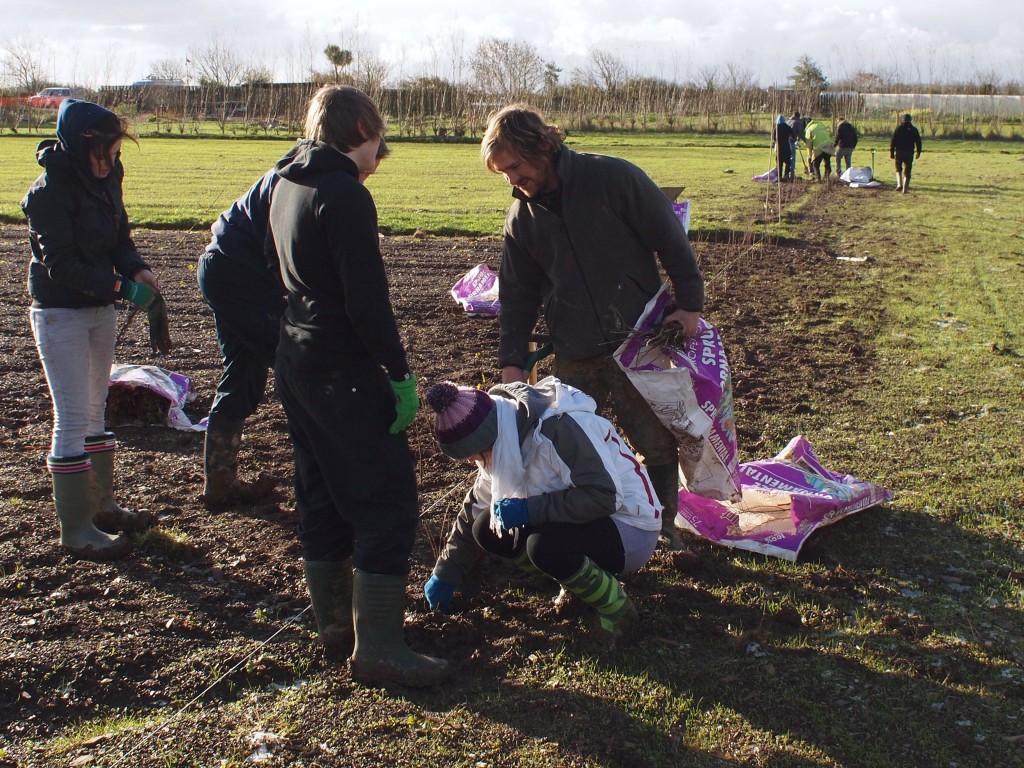
Under the guidance of Camel CSA’s professional growers Jeremy Brown and Mark Norman, the students planted mainly hawthorn with hazel, guelder, blackthorn and dog rose. These will provide a haven for wildlife and shelter from the Cornish gales.
The 15-16-year-olds are following a mix of vocational pathways from agriculture to mechanics. They’re already helping to develop the school’s own veg plot on the Wadebridge allotment site.
Youngsters hedge their bets with a day on the land – Cornish Guardian.
Rabbit-proof fence
Camel CSA’s own volunteer growers have also been busy constructing a sturdy rabbit-proof fence to protect the hedge plants and to keep the bunnies and other predators off our vegetable crops.
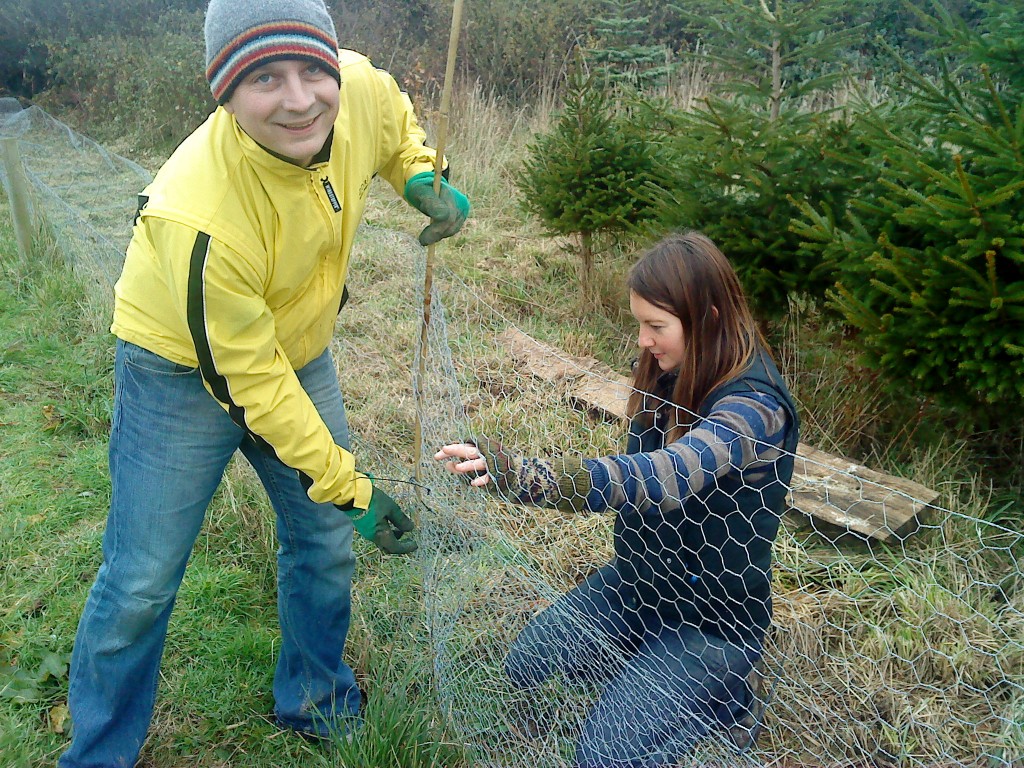
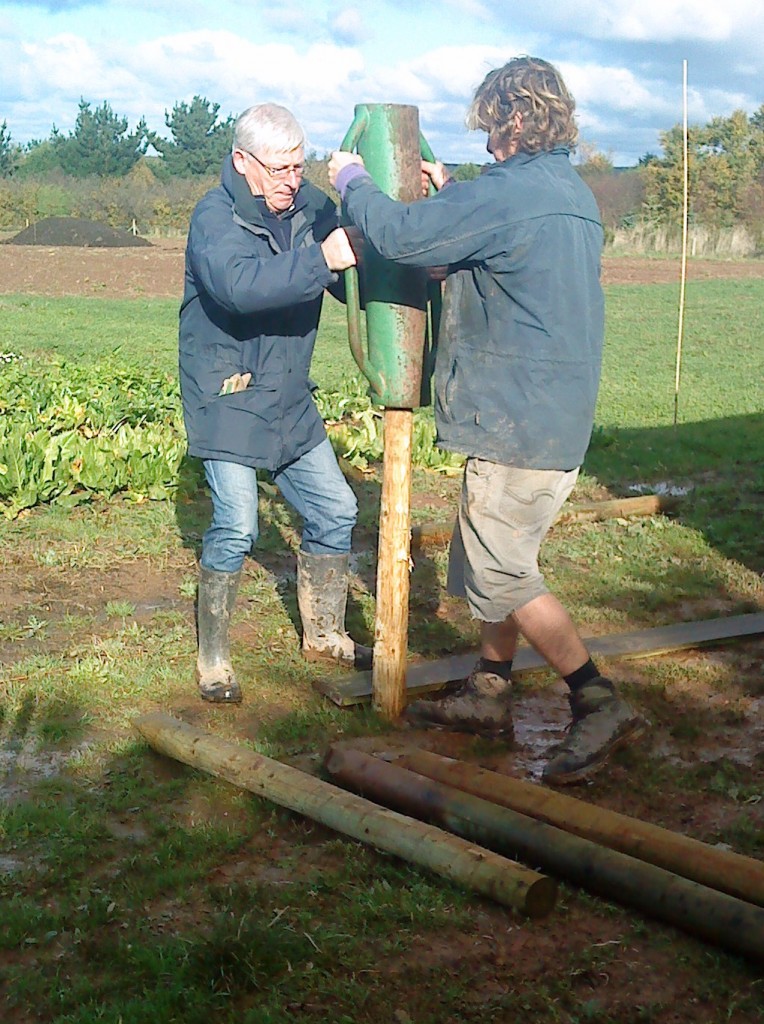

The gentle, smoky flavour of this heart-warming recipe by Nigel Slater comes from the Jerusalem artichokes. It’s a perfect antidote to the cold winter weather we’re having in Cornwall at the moment. Find it in his cookbook Tender Volume 1.
Preparation / cooking: one hour
Serves: 4
Ingredients
8 really good pork sausages
olive oil
4 medium onions
2 cloves of garlic
250g small mushrooms
500g Jerusalem artichokes
1 large lemon
1 tsp fennel seeds
light stock or water to cover – about 500ml
a small bunch of flat-leaf parsley, roughly chopped
Steamed cavolo nero, spring cabbage or purple sprouting broccoli, to serve
Method
Brown the sausages all over in a little oil in a deep casserole. Set aside. Peel the onions and cut them into thick segments, then add to the pan in which you browned the sausages, pouring in a little more oil if you need to. Let the onions soften over a moderate heat till they are tender enough to crush with a wooden spoon. Don’t hurry this; it should take about 15 to 20 minutes. Peel and finely slice the garlic and add it to the onions. Halve the mushrooms and add them too.
Peel or simply scrub the artichokes, then cut them in half. Add them to the pan, pushing the onions aside, and let them colour slightly. Now tip the sausages back into the pan. Cut the lemon into fat chunks and tuck them in along with the fennel seeds and a good seasoning of salt and black pepper.
Pour over enough stock or water to cover and bring to the boil. Turn the heat down and simmer for about 30 minutes, until the vegetables are truly tender. If there is too much liquid, turn up the heat and let it reduce a little. Stir in the parsley, check the seasoning and eat with the greens.
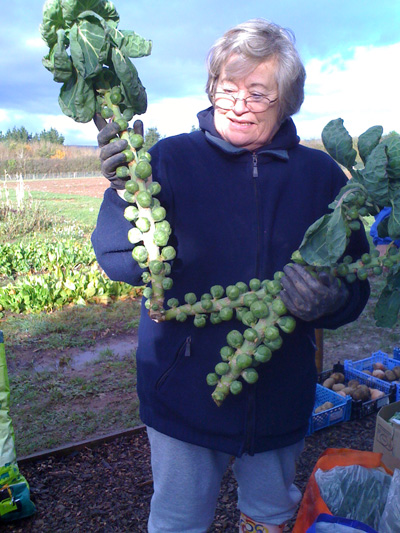
This week’s small boxes will have:
potatoes (Benbole Farm)
onions (Restharrow Farm, Trebetherick)
carrots (Restharrow Farm)
romanesco (Restharrow Farm)
sprouts on a stem (Restharrow Farm)
curly kale (Restharrow Farm)
* jerusalem artichokes (Camel CSA)
Standard boxes will have the same with extra potatoes and onions plus:
* leeks (Jeremy Brown, St Kew Harvest)
parsnip (Restharrow Farm)
swede (Restharrow Farm)
* = grown to organic principles

November 21, 2010
Camel CSA is strong on community spirit according to the Cornish Guardian, our local weekly newspaper.
It reports that our vegetable-growing co-operative is going from strength to strength now we’ve won Lottery and ECLAG funding.
We’re seeking to increase our membership and welcome new members living within a 10-mile radius of St Kew Highway to join our weekly veg box scheme.
Camel CSA secretary Mike Sadler told the paper: “Over the past two years we’ve learned a lot. The first growing season was a hard lesson; we had problems with the quality of the soil and predators such as birds and rabbits.
“The second growing year has been much more successful and we’re looking forward to inviting local schools and organisations to come to the site and learn the importance of growing produce and introducing them to healthy living.”
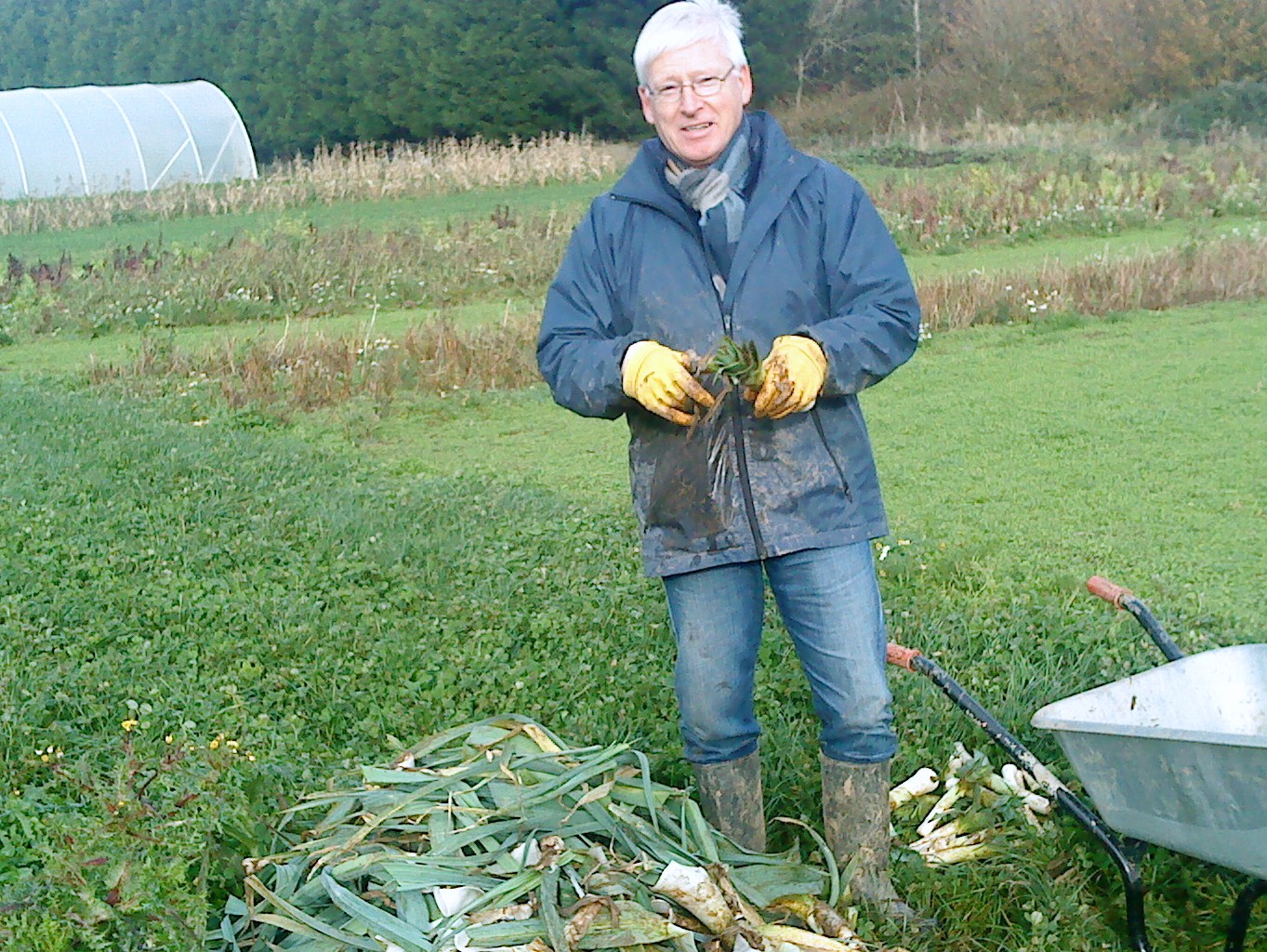
November 19, 2010
It’s a good thing I’m very fond of leeks, as I dug up 90 of them this morning for Camel Community Supported Agriculture’s weekly veg boxes. It certainly made me appreciate where my food comes from.
After all the torrential rain in Cornwall lately, the earth was distinctly claggy. My boots got heavier and heavier as the mud stuck to them, and my clothes, hands and face were splattered with streaks of soil.
I wasn’t the only one, of course. This sort of task is routine for members of Camel CSA’s volunteer picking and packing team.
While I tussled with the leeks, Mike was trimming them. He also dug and washed the Jerusalem artichokes. Anne and Cath were pulling up beetroot and fennel. Robert was sorting and labelling the boxes and rinsing the leeks. Meanwhile in the shed Trish and Henrietta were weighing and sharing out the rest of vegetables to go in the boxes.
A total of 30 boxes of fresh, seasonal food achieved in just over an hour’s work… how ever will we cope when we reach our weekly target of 90?!
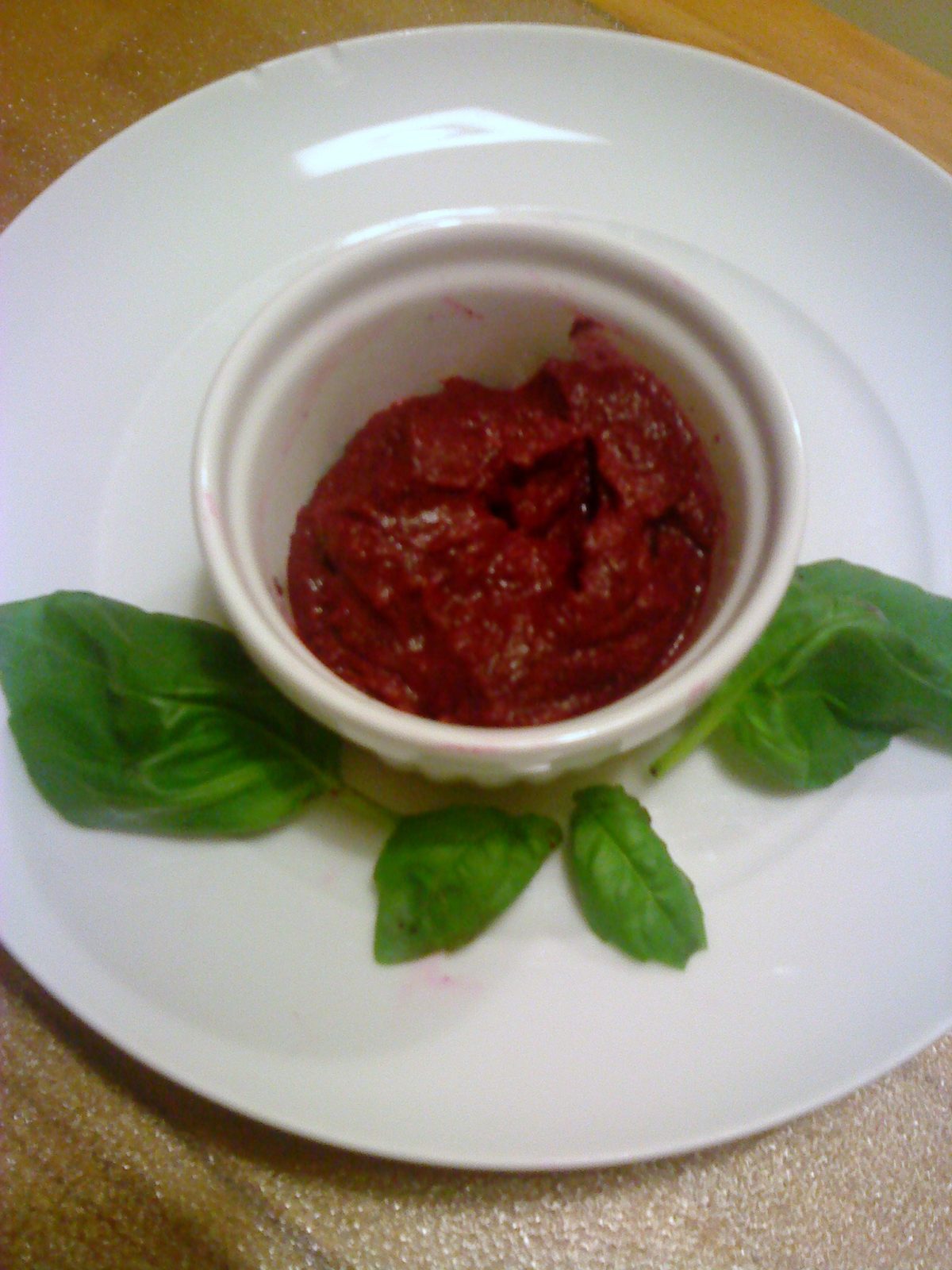
Kitty, who’s one of Camel CSA’s volunteer growers, has this amazing recipe for a beetroot dip. It arose out of a slight culinary accident when she was roasting some beetroot. She brought the dip to our first Big Lunch, where everyone raved about it. It’s the most incredible colour!
Serves: 6
Preparation / cooking: one hour
Ingredients:
6 smallish beetroot
Juice of half a lemon
1 chopped garlic clove
2 tbs olive (or other) oil
2 tbs yoghurt
salt, pepper
chopped mint or basil
Method:
Kitty says:
Bake about 6 smallish beetroot in their skins until soft (I forgot mine which is how this dish came about!) Alternatively, you could boil them. Peel them and then liquidise with juice of half a lemon, a chopped garlic clove, and a couple of tablespoons of olive (or other) oil. Season to taste.
Stir in a couple of tablespoons of yoghurt and add some chopped fresh mint or basil if you wish. Serve with crudites or pitta. Moro East has a similar recipe with tahini instead of yoghurt, which I intend to try next.
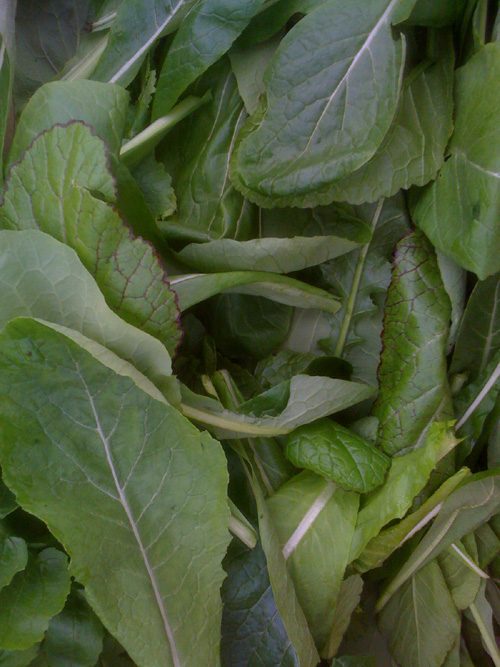
November 18, 2010
In the small boxes:
* jerusalem artichokes (Camel CSA)
* beetroot (Camel CSA)
potatoes (Benbole Farm)
* leeks (Jeremy Brown, St Kew Harvest)
* salad bags (Jeremy)
onions (Restharrow Farm, Trebetherick)
parsnips (Restharrow Farm)
Standard boxes will have the same with extra potatoes and onions plus:
* fennel (Camel CSA)
cauliflower (Restharrow Farm)
tuscan kale (Restharrow Farm)
* = grown to organic principles
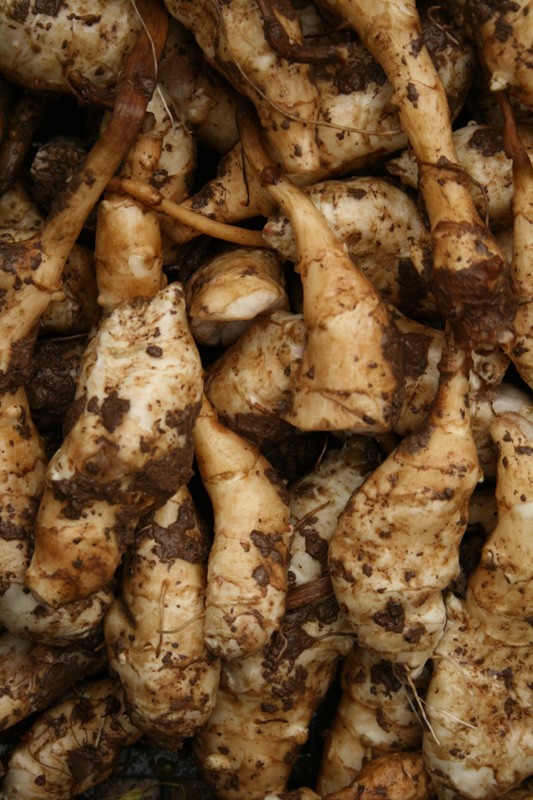
November 12, 2010
Yotam Ottolenghi’s timely recipe from last Saturday’s Guardian Weekend magazine: ‘Slightly sweet and vaguely mushroomy, jerusalem artichoke is here combined with goat’s cheese, egg and lemon in a very elegant dish.’ Make it in ramekins or shallow, ovenproof soup bowls.
Serves 4 to 6
Preparation/cooking: about an hour
Ingredients
grated zest and juice of half a lemon
300g jerusalem artichokes
30g walnuts
60g unsalted butter
25g plain flour
250ml milk
3 small free-range eggs, separated
¼tsp chilli flakes
½tbsp chopped thyme
120g hard goat’s cheese, grated
¼tsp salt
Method
Heat the oven to 200C/gas 6. Put a baking sheet on the top shelf. This will help the soufflés rise.
Pour the lemon juice into a pan and add enough water to half-fill the pan. Peel the artichokes and immediately drop them in the water so they don’t discolour. Once they’re all peeled, bring to a boil and simmer for 40 minutes, until soft. Drain and transfer to a small food processor bowl. Work to a purée, adding a little water if needed to bring it together. You will need exactly 130g of purée. Put the ramekins in the fridge to chill.
Meanwhile blitz the nuts until powdery. Melt half the buter, and brush inside the ramekins. Spoon walnut powder into each ramekin and turn the dishes so it coats the base and sides. Tip out any excess powder.
Over a moderate heat, melt the remaining butter in a medium pan. Stir in the flour, cook for a minute, then gradually add the milk, stirring, until the sauce is thick and bubbles appear on the surface.
In a large bowl, mix the 130g jerusalem artichoke purée, the egg yolks, chilli, thyme, cheese, lemon zest and salt. Add the sauce and stir until smooth. Set aside to cool down.
Put the egg whites in a large, clean bowl and whisk until stiff but not dry. Add a little of the egg white mix to the artichoke base and stir to loosen, then fold in the remaining egg whites with a large metal spoon, taking care to retain as much air as possible.
Fill up each ramekin with the soufflé mix so it comes up 1.5cm short of the top. Place on the heated baking sheet, and bake for 12-18 minutes, until golden brown and risen well. Serve at once.
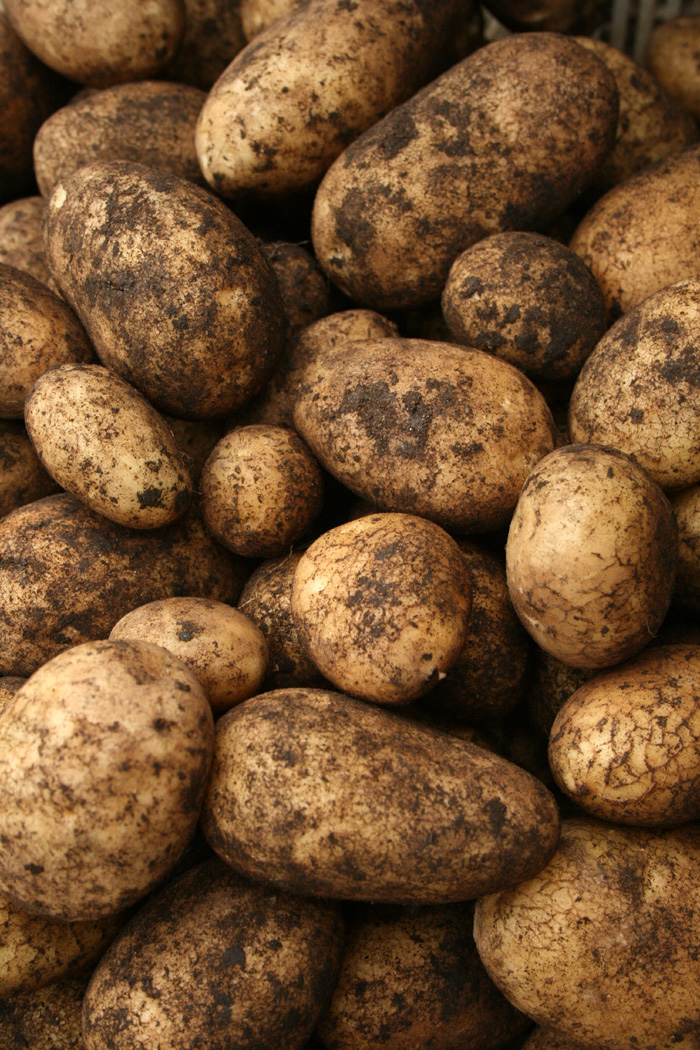
November 11, 2010
We have fuller boxes this Friday as vegetable prices are much lower now.
Small boxes will have:
potatoes (Benbole Farm)
* carrots (Camel CSA)
* jerusalem artichokes (Camel CSA)
cauliflower (Restharrow Farm, Trebetherick)
onions (Restharrow Farm)
* leeks (Jeremy Brown, St Kew Harvest)
* crown prince squash (Jeremy)
Standard boxes will have the same with extra potatoes and onions plus:
parsnip (Restharrow Farm) or celeriac (Camel CSA)
swede (Restharrow Farm)
kale (Restharrow Farm) or calabrese (Jeremy)
* = grown to organic principles
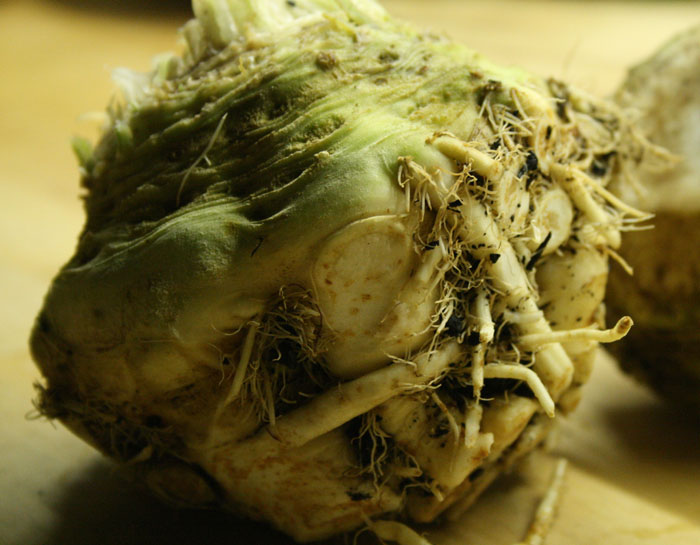
November 5, 2010
Nigel Slater describes celeriac in his Tender cookbook: ‘Knobbly, whiskery and impenetrable, its roots curled round its feet like a viper’s nest, it poses something of a problem for the newcomer’. Thankfully he also gives this good recipe for a variation on the classic French remoulade. First off, though, you’ll have to ‘Brush off the encrusted soil, hack away at the thick, warty skin …’
Radish sprouts are sprouted seeds with a spicy heat. If you can’t get hold of them, you could sprout your own in a salad sprouter. Equally, you could use any sprouted seed.
Preparation/cooking: half an hour
Serves 2 as a light main course
Ingredients
for the dressing:
250ml crème fraîche
juice of half a lemon
2 tbsp grain mustard
for the salad:
large handful parsley leaves
about 500g celeriac
8 rashers smoked bacon
50g radish sprouts or mung bean sprouts
Method
Mix the crème fraîche, lemon juice and mustard together and stir in a little salt and black pepper.
Roughly chop the parsley. Peel the celeriac and shred it coarsely. This is probably easiest with a food processor and coarse grater attachment. Grill the bacon until it is starting to crisp and the fat has turned gold, then cut it into pieces the size of a postage stamp. Stir the celeriac, radish sprouts, parsley, bacon and dressing together. Serve while the bacon is still hot.


